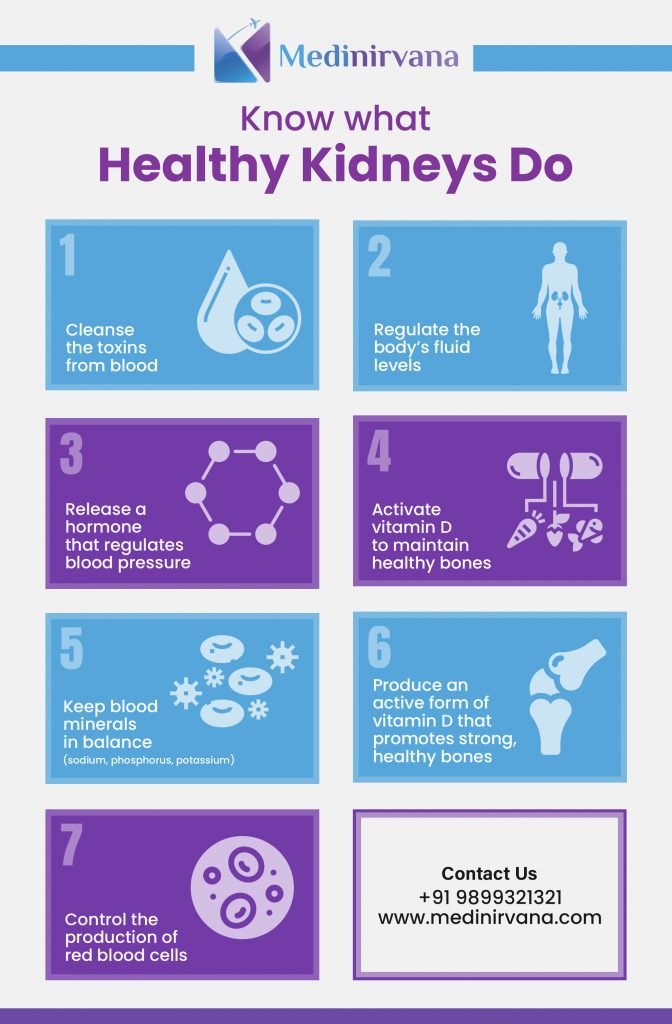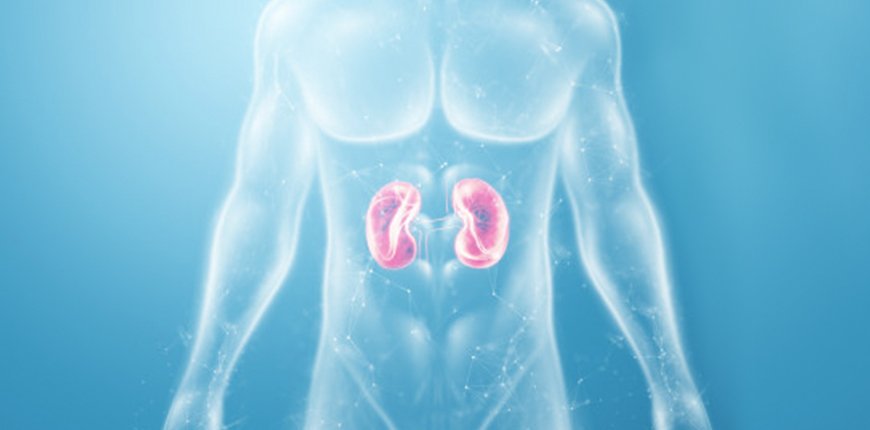Are you looking for help with Acute Kidney Failure? If your answer is a yes, it is time for you to know more about Acute Kidney Failure treatment in India that will help you access the best treatment at an affordable pricing.
Table Of Contents
Feel free to skip ahead if one topic catches your eye:
- Signs and symptoms of Acute Kidney failure
- Acute Kidney Failure Causes
- Medical Procedure of Kidney Failure in India
- Recovery and post-treatment care in India
- Why choose India for acute kidney failure Treatment?
Takeaway
- Signs and symptoms of Acute Kidney failure
Acute kidney failure, also known as acute kidney injury or acute renal failure, occurs when the kidneys suddenly become incapable of filtering waste products from the blood. Harmful waste gets accumulated when the kidneys lose their ability to filter and this, in turn, leads to imbalances of chemical makeup. This severe health complication usually develops in less than a few days. It is important to note that this health condition may be fatal and, therefore, requires urgent and intensive treatment.
Signs and Symptoms
- Shortness of breath
- Reduced output of urine
- Fatigue
- Nausea
- Chest pressure or pain
- Muscle twitching
- Loss of appetite
- Joint pain and swelling
- Drowsiness
- Weakness
- Confusion
- Coma or seizures in severe cases
- Fluid retention, resulting in swelling in ankles, feet, or legs
- Acute Kidney Failure Causes
The causes of Acute Kidney failure include:
- Direct damage to the kidneys
- Acute tubular necrosis (ATN)
- Urinary tract obstruction
- Malignant hypertension
- Scleroderma
- Transfusion reaction
- Hemolytic uremic syndrome
- Autoimmune kidney diseases like interstitial nephritis and acute nephritic syndrome
- A health condition that slows down the flow of blood to the kidneys
- Blockage of the urine drainage tubes of kidneys
Some health conditions may slow down the flow of blood to the kidneys and result in injuries. The list of such health conditions includes infection, heart attack, fluid or blood loss, blood pressure medications, liver failure, severe allergic reaction (anaphylaxis), severe dehydration, severe burns, and the use of ibuprofen, aspirin, naproxen sodium, or related drugs.
The undermentioned conditions, agents, and diseases may result in kidney damage and cause acute kidney failure:
- Deposits of cholesterol that inhibit the flow of blood in the kidneys
- Blood clots in the arteries and veins in and around the kidneys
- Thrombotic thrombocytopenic purpura
- Lupus, an immune system disorder resulting in glomerulonephritis
- Infections like the virus causing COVID-19
- Medications like specific chemotherapy drugs, dyes, and antibiotics used during imaging tests
- Glomerulonephritis, inflammation of the small filters in the kidneys
- Toxins like heavy metals, cocaine, and alcohol
- Breakdown of tumour cells
- Breakdown of muscle tissue
Some conditions and diseases may block the passage of urine in the body and result in acute kidney injury:
- Cervical cancer
- Colon cancer
- Bladder cancer
- Enlarged prostate
- Blood clots in the urinary tract
- Prostate cancer
- Kidney stones
- Nerve damage involving the bladder-controlling nerves
- Medical Procedure of Kidney Failure in India
The doctor may prescribe laboratory tests such as:
- Estimated glomerular filtration rate (eGFR)
- Creatinine clearance
- Serum creatinine
- Blood urea nitrogen (BUN)
- Serum potassium
- Serum sodium
- Urinalysis
- Kidney biopsy
Ultrasound may be the first-line method to diagnose acute kidney failure. An abdominal CT scan, abdominal MRI, and abdominal X-ray may help your doctor to evaluate any blockage present in the urinary tract.
The doctor may prescribe medications such as:
- Phosphorus-lowering medications such as calcitriol (Rocaltrol), sevelamer (Renagel), and calcium carbonate (Caltrate)
- Red blood cell production (iron supplementation)
- Vitamins
- Blood pressure medications
- Red blood cell production stimulation such as darbepoetin (Aranesp) and erythropoietin (EPO)
Once the kidneys fail entirely, treatment options are limited to kidney replacement by transplantation or dialysis. Kidney transplantation is considered a better option than dialysis if kidney failure is non-reversible. In such cases, the surgeon and nephrologist will reach out to an organ transplant centre to arrange an evaluation to find out if the patient is suitable for the treatment. If the patient seems fit, the search for a compatible donor starts. In some instances, family members may have compatible tissue types and may donate a kidney.
The hospital will conduct some tests such as blood typing, tissue typing, and crossmatch to ensure the patient receives the most appropriate donor kidney according to their kidney size and matching age.
During the procedure, the surgeon will make an incision in the lower part of one side of the abdomen to place the new kidney into the body. Thereafter, the surgeon will attach the new kidney’s blood vessels to blood vessels in the lower region of the abdomen and then the ureter of the new kidney is connected to the bladder. Once the procedure has been successfully completed, medical professionals will monitor the progress of the patient in the transplant recovery area of the hospital.
One of the biggest advantages of kidney transplantation in India is that overseas patients don’t have to wait for months. Indian hospitals are known to arrange the kidney for transplants within a short notice. Once a match has been found, the patient is notified and a kidney transplant is recommended. The procedure helps patients experience better quality of life, lower treatment cost, and fewer dietary restrictions.
It is important for patients to perform a comprehensive research about the best hospitals for kidney transplantation in India. For this, they can enquire about the type and number of transplants the hospital performs each year, the kidney transplant survival rates, transplant centre statistics, and different donation programs. It is also suggested that the patient must have a clear and complete understanding of the treatment costs before, during, and after the transplant. These costs will pertain to diagnostic tests, surgery, hospital stays, and transportation to and from the hospital for the procedure and follow-up appointments. It is also recommended that patients must have a complete understanding of other related services provided by the kidney transplant hospital like travel arrangement, local housing, and support groups for the recovery period.

- Recovery and post-treatment care in India
Patients may experience soreness, swelling, pain, or discomfort after the procedure. However, they can be alleviated with antibiotics, anti-inflammatory medication, and pain-relieving drugs. Usually, the recovery time after kidney transplant surgery is 4-8 weeks though it may vary. During the healing and recovery period, patients are advised not to lift objects weighing more than 10 pounds. They should not engage in intense workouts, cardio sessions, or strength training. It is equally important for patients to strictly follow the post-operative care instructions as suggested by the surgeon. Moreover, patients should regularly visit the surgeon and the hospital for regular checkups to monitor progress and overall health.
The factors affecting the recovery include the general and overall health of the patient, medications, type of surgery performed, adhere to pre-and post-operative instructions, etc. The success rate of kidney transplantation in India is approximately 92-96 percent though it may vary from hospital to hospital.
- Why choose India for acute kidney failure Treatment?
India is home to some of the world’s most reputed and renowned surgeons, doctors, medical professionals, and hospitals. A majority of Indian hospitals have state-of-the-art infrastructure and take great pride in creating and maintaining the highest standards of pre-and post-operative treatment, compassionate care, easy paperwork, and holistic and innovative treatment. Medical facilities at these hospitals are on par if not exceeding with that of hospitals in developed nations of the world.
Recently, the Indian government has introduced the concept of hassle-free, streamlined, and quick medical visa to patients from all parts of the world who wanted to access speciality medical treatment in India. Patients and their families have to deal with minimal documentation and visa grants are almost instant. The best thing about availing medical treatment in India is that the associated costs are one-fifth or even one-tenth of the healthcare costs that patients would have incurred if had they opted for a treatment in developed countries. This is one of the biggest reasons why patients from the United States, Canada, UAE, Germany, France, and the United Kingdom come to India for their acute kidney failure treatment.
Moreover, Indian hospitals and medical professionals are known to walk the extra mile to ensure safety and care of patients and their families. Offering top-notch compassionate care and healthcare services, Indian hospitals ensure every patient could receive personalised care and attention. Patients even visit the incredible India after successfully completing their acute kidney failure treatment. One of the biggest advantages of choosing India as a medical tourism destination is that the country is home to some of the most beautiful and mesmerising historic places, tall hills, landscape, wildlife-watching excursion, camps, beautiful farms, rivers, scenic destination, treks, and cultural diversity. Furthermore, accommodation and travel costs in India are relatively low when compared to that of other countries. If this is not all, India is home to places such as Taj Mahal, Hawa Mahal, Ranthambore National Park, and Kerala (the God’s own country).
Takeaway
Acute Kidney Failure is a severe and debilitating health condition that requires urgent and expert assistance. You may reach out to Medinirvana, one of the most trusted providers of medical tourism services in India, to access the best hospitals in India for Acute Kidney Failure treatment. The team of experienced and helpful professionals at Medinervana can help you with identifying the best hospitals for Acute Kidney Failure treatment and medical visa documentation.









Leave a Reply